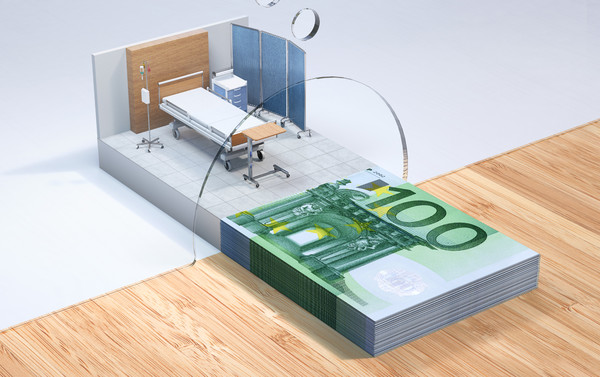Due to the government’s post-Omicron response system, severely ill Covid-19 patients may be bombarded with medical bills after the end of May, experts said Monday.
The government has recently adjusted the statutory infectious disease rating of Covid-19 from 1st to 2nd grade, discontinuing its full support for its treatment and leaving individuals to shoulder part of their treatment costs under the national health insurance system.

Currently, the government subsidizes medical bills only during the quarantine period, but even that will disappear, posing heavy burdens on critical patients.
The government announced the downgrading of Covid-19’s statutory infectious disease rating on Friday to convert the healthcare system from the present emergency system to the general system. There are now 21 Grade 2 infectious diseases, including tuberculosis, measles, cholera, and chickenpox.
Health officials will go through the preparation process and implement these and other measures of the post-Omicron response system by dividing them into a transition period (four weeks from April 25) and a settlement period (after the end of May).
The seven-day quarantine is an obligation in the transition period, but it will change into a recommendation in the settlement period. Notably, the government will fully support the Covid-19 treatment cost until the transition period. After the end of May, patients will receive no state subsidies except for health insurance coverage, shouldering heavier burdens. The patients’ coinsurance rate will also likely be decided after the end of May.
Patients will also have to pay for the rapid antigen test (RAT) conducted by medical professionals. Currently, they have only to pay 5,000 won ($4), or 30 percent of the treatment cost, but they should pay part of 17,000 won for RAT from June.
Lee Jae-gap, an infectious medicine professor at Hallym University Gangnam Sacred Heart Hospital, predicted Friday that Covid-19 patients’ financial burdens would grow while explaining the difference between Grade 1 and Grade 2 infectious disease, appearing on Corona Fighters Live, a YouTube broadcast aired by The Doctors’ Weekly, the sister paper of Korea Biomedical Review.
“After the transition period is over, parts of Covid-19 medical expenses will be borne by patients, and coinsurance rate for their hospitalizing costs will also be decided,” Lee said. “Severely ill patients require artificial respirators and must receive ECMO (extracorporeal membrane oxygenation) treatment at an intensive care unit. So far, patients have not felt it burdensome as the government subsidized the expenses. However, patients will have to shoulder considerable burdens from June as they must pay part of them.”
Already, there have been cases of critically ill Covid-19 patients paying several tens of millions of won after quarantine as their treatment periods are prolonged.
“There could be a situation when individuals have to pay 20,000-30,000 won for rapid antigen testing after the transition period,” Professor Lee said. “The downward adjustment of Covid-19 to 2nd Grade infectious disease should not necessarily mean that the government won’t have to subsidize treatment costs.”
Acknowledging that now is the time to adjust the social distancing system now that the Omicron wave’s peak is over, Lee warned against complacency, thinking that Covid-19’s danger has disappeared. He also emphasized that the government has concrete plans to make people live safely even after the restrictions are lifted and share them with the people.
“It seems as if many people regard the lifting of Covid-19 curbs as a festivity of sorts. However, the Covid-19 virus remains lethal to the high-risk group and can result in mass infection,” Professor Lee said. “The disease’s toxicity has been reduced, and people got safer thanks to immunity through vaccination and other processes, but danger remains. The government should continue to strive to reduce such hazards but seems to be making insufficient efforts for such communication.”
More specifically, Lee noted that the government needs to recognize it as a disease deserving sick leaves, although it may be able to dispense with obligatory quarantine.
“Most dangerous are medical institutions. If medical workers are infected, they should take a leave. However, if the government discontinues obligatory quarantine, hospital managers can force their employees to take annual leaves instead of sick leaves,” he said. “Sick medical workers should not be forced to work. However, the government has yet to make supplementary measures in this regard.”

